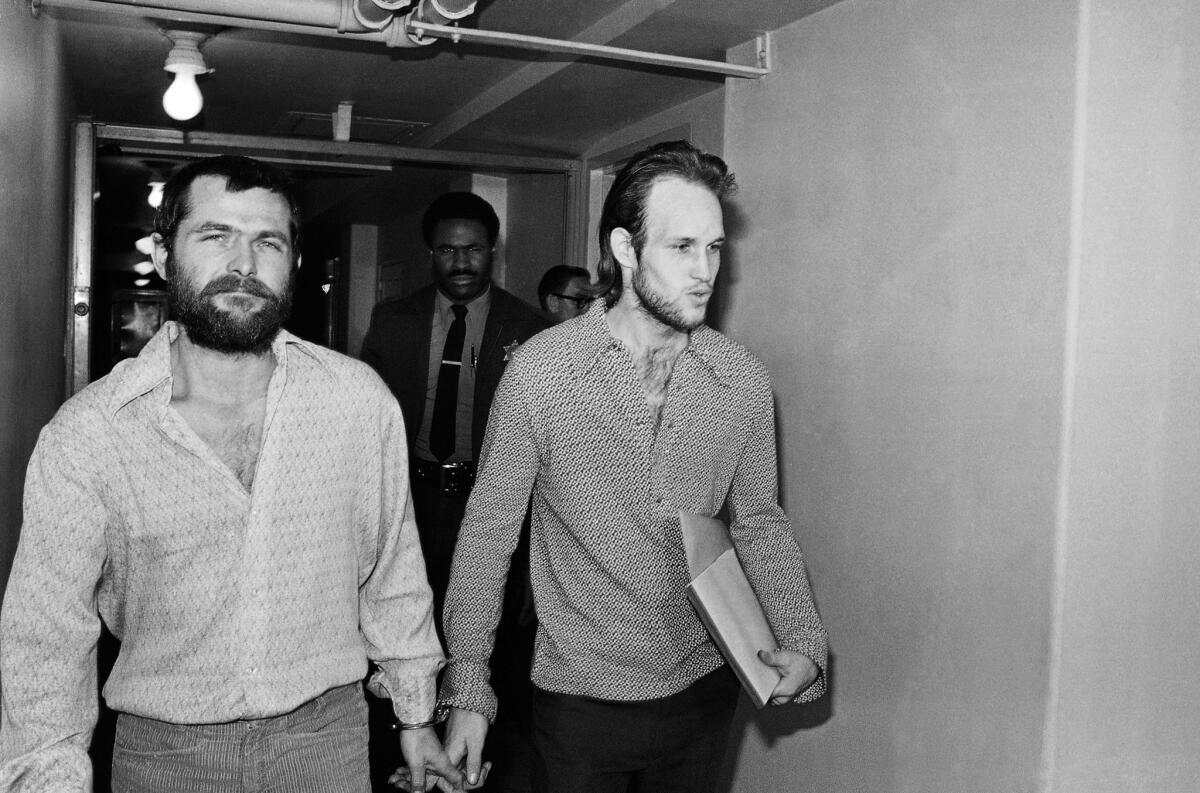For the third time, Brown rejects parole of Manson follower Bruce Davis, 73

This Dec. 22, 1970, photo shows Charles Manson followers Bruce Davis, left, and Steve Grogan leaving court after a hearing in Los Angeles.
- Share via
Gov. Jerry Brown has rejected parole for a third time for a follower of cult leader Charles Manson 46 years after a series of bloody murders rocked Southern California.
Bruce Davis was convicted of the 1969 slayings of musician Gary Hinman and stuntman Donald “Shorty” Shea. He was not involved in the more notorious killings of actress Sharon Tate and six others.
Brown said on Friday that the 73-year-old Davis remains a danger to public safety, saying in his decision that the “horror of the murders committed by the Manson Family in 1969 and the fear they instilled in the public will never be forgotten.”
The governor said Davis spent years downplaying his role in the family.
“As I’ve discussed twice before, Davis’s own actions demonstrate that he had fully bought into the depraved Manson Family beliefs,” Brown wrote in his decision. “He not only watched as Manson cut Mr. Hinman’s face open with a sword, but held him at gunpoint while Manson was doing so.”
Tate’s sister Debra Tate, who spoke against Davis’ parole at his hearing to represent Manson’s victims, had not yet heard about the governor’s rejection when reached by phone by The Associated Press.
“Oh God, I am so glad he did that,” Tate said. “I have been sweating bullets, as you can imagine.”
Tate said the consistent rejection of parole for Manson followers from governors through the years has not given her any comfort, and California’s recent moves to release older prisoners have left her especially worried.
“I see it as a very viable possibility that all of them could be let out,” Tate said. “None of them are secure.”
Brown blocked Davis’ parole twice before, most recently in 2014, and former Gov. Arnold Schwarzenegger also previously opted to keep Davis imprisoned at California Men’s Colony in San Luis Obispo.
Davis is serving a life sentence after he was convicted of two counts of first-degree murder and conspiracy to commit murder and robbery. He became a born-again Christian behind bars, earned a doctoral degree in philosophy of religion and ministers to other inmates.
A message left with Davis’ attorney, Michael Beckman, was not immediately returned on Friday. Beckman said previously that the Board of Parole Hearings was simply following the law when it recommended the release of a man who is no longer dangerous.
Los Angeles County prosecutors argued against his release, citing the gruesome nature of the crimes that kept Southern Californians fearful for months. They also noted that Manson’s intent was to spark a race war, based on his interpretation of the Beatles song “Helter Skelter.” He thought the slayings would spark an Armageddon-like war between whites and blacks that would benefit his “family” of disciples.
See more of our top stories on Facebook >>
The governor wrote Friday that Davis has still “not explained what, other than a desire for acceptance, allowed him to suspend reality to accept that Helter Skelter was real and that he needed to contribute — in a violent way — to the beginning of the apocalypse.”
Debra Tate said that she has seen many Manson family members at hearings through the years. She said that while they have sometimes led exemplary lives in the controlled environment of prison, “these are sociopaths.”
She fears what would happen to them in the real world, where “the challenges of everyday life could turn them back into the same monsters they were in 1969.”
ALSO
Academy president says Oscar changes are ‘the right thing to do’
A ‘man-made disaster’ unfolded in Flint, within plain sight of water regulators
Carson mayor upset by how Chargers and Raiders treated the city
More to Read
Sign up for Essential California
The most important California stories and recommendations in your inbox every morning.
You may occasionally receive promotional content from the Los Angeles Times.









